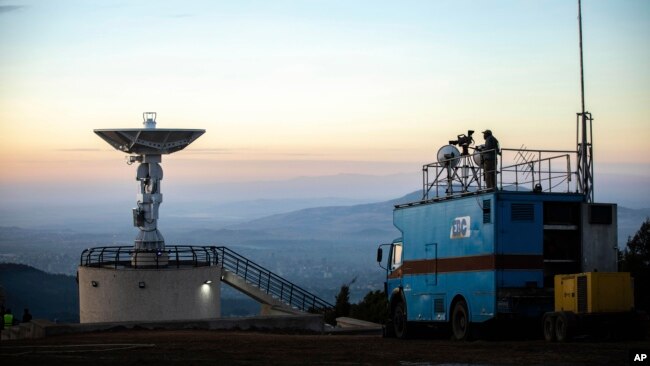宇宙協力でタッグを組む中国とアフリカ
失われた30年、追い討ちを掛けたアベノミクスの失策。それに追従した日銀。過去の経済大国という名の亡霊に取り憑かれて、技術革新・人材育成を怠ってきた企業。長期的視点に立った生き残り戦略を構築してこなかった井の中の蛙と化した経済界と政府。平和利用を最優先に国家戦略として捉えてこなかった宇宙開発。
崇高な理念だけでは、国家を存続させることはできません。
VOAで英語を学びましょう!
目を輝かせるアフリカ諸国の学生たちが羨ましい!
中国とアフリカ、宇宙で協力する理由は異なる(和訳)
China, Africa Cooperate in Space for Different Reasons
September 17, 2022
専門家たちは、中国とアフリカ諸国は、将来に向けてさまざまなアイデアを開発するために、宇宙でますます協力し合うようになっていると言いています。
中国の宇宙飛行士はタイコウノート として知られています。彼らはティアンゴン(天宮)宇宙ステーションで6ヶ月の任務を遂行しながら、宇宙外交を展開しています。宇宙構造物は現在建設中です。
今月、3人のタイコウノート(中国の宇宙船に搭乗する宇宙飛行士)がアフリカ8カ国の学生たちにビデオ通話で話しかけました。アフリカ連合への中国代表団がこのイベントをサポートしました。
テミダヨ・オニオスン氏は、ナイジェリアの宇宙科学者です。また、ウェブサイトSpace in Africaを監修しています。「このイベントは、中国とアフリカ諸国の継続的な協力関係を反映するものです」と、彼はこのイベントについてVOAに語ります。
講演の中で、エチオピア人の若者が、宇宙飛行士は宇宙で何を食べているのか、どうやって体を洗っているのか、と質問しました。また、ソマリアの学生からは宇宙旅行の将来について、エジプトの学生からは、女性が宇宙飛行士になるのは難しいのかという質問がありました。
3人のタイコウノートは、それぞれの質問に丁寧に答えました。また、軌道上で食べている食べ物も紹介されました。それは、"おいしい紫米のお粥、おいしいスイートコーンと松の実のソテー、角切り牛肉の黒胡椒ソース "などでした。タイコウノートたちは、宇宙にはほとんど重力がないため、シャワーを浴びることができないことを説明しました。
アフリカにおける中国の利益
オニオサン氏は、この共同作業は”必ずしも中国やその他の国がアフリカを助けるために関与しているのではなく、彼らは見返りとして経済、社会、文化資本を得るためにそうしているのです”と述べています。
中国は、米国を除くどの国よりも多くの衛星を管理しています。2020年のジョンズ・ホプキンス大学高等国際問題研究所のワーキングペーパー(下記リンク)によると、中国のアフリカにおける”リモートセンシング衛星ネットワーク”は、中国の一帯一路(BRI)開発プログラムの支援に役立っているといいます。”パートナー国家”を結ぶことは、宇宙での協力の用途の1つであると述べてとそれは言っています。
アジスアベバでのイベントで、中国のAUミッションの責任者であるフー・チャンチュン(胡長春)氏は、宇宙はシー・ジンビン(習近平)主席の一帯一路構想の重要な一部であると述べました。その目標は、発展途上国で道路、橋、港、鉄道、および同様の構造物の大規模プロジェクトを迅速に建設することです。
彼は、"一帯一路構想の指導の下、...宇宙協力は中国とアフリカの協力のハイライトになっている "と述べています。
宇宙におけるアフリカの利益
オニオサン氏は、2021年のアフリカの宇宙経済規模は約195億ドルと評価されると述べました。今後4年間で16%成長すると予測されていると彼は言います。2022年現在、アフリカの13カ国が48基の衛星を保有しています。うち6基は中国が、1基は米国が建設しました。 専門家たちは、アフリカのコミュニケーションには衛星通信が極めて重要だと言います。
中国は2007年にナイジェリア初の通信衛星を打ち上げ、2011年には2号機を打ち上げました。また、中国は2017年にアルジェリア初の通信衛星を打ち上げています。専門家らによると、チュニジアは2018年、 ベイドゥ(北斗)衛星航法システムの中国国外初の地上受信基地の本拠地となったということです。
中国はまた、2019年にエチオピアとスーダンが初の人工衛星を打ち上げるのを支援しました。
現在、アフリカの20カ国以上が宇宙開発プログラムを持っています。最近のAUと中国の宇宙飛行士のイベントは、アフリカの若者の興奮を高めるためのものだったとジュリー・クリンガーは言います。彼女はデラウェア大学の助教授で、VOAの取材に答えました。
クリンガー氏は、アフリカの国々は、宇宙開発競争や軍事利用、あるいは有人宇宙飛行に興味があるわけではないと述べています。
彼らは、"社会経済的な発展 "のための宇宙により興味を持っているのです。クリンガー氏は、気候変動や環境観測、災害対策は、すべて中国とアフリカの宇宙協力の重要な部分であると付け加えています。
しかし、クリンガー氏は、中国はアフリカの政府との宇宙技術契約のために競争入札に参加しなければならない、と述べた述べています。
「正直なところ、彼らはいつも勝つとは限りません。特にアフリカでの衛星活動の大部分は、アフリカ政府が資金を提供しています」と彼女は言います。ほとんどの契約はフランスが獲得しています。中国が2番目。そして、アメリカは4番目です。
タイコウノートたちとの質疑応答に参加した学生たちは、アフリカ諸国がどこの国と提携しているかなんて気にも留めていないかもしれません。しかし、彼らの中には、いつか自分も宇宙飛行士になって宇宙を目指す人がいるかもしれません。
China, Africa Cooperate in Space for Different Reasons
Experts say China and African nations are increasingly cooperating in space to develop different ideas for the future.
Chinese astronauts are known as taikonauts. They have been carrying out space diplomacy while on a six-month mission on the Tiangong space station. The space structure is in the process of being built.
Three taikonauts spoke to students from eight African countries through a video link this month. The China Mission to the African Union supported the event.
Temidayo Oniosun is a Nigerian space scientist. He also supervises the website Space in Africa. “This event is a reflection of the ongoing collaboration between China and African countries,” he told VOA about the event.
During the talk, a young Ethiopian asked what astronauts eat in space, and how they wash themselves. A Somali student wanted to know about the future of space tourism and a student from Egypt wanted to know whether it is difficult for women to become astronauts.
The three taikonauts answered their questions in detail. They showed the students food they eat while in orbit. It included “delicious purple rice porridge, tasty sautéed sweet corn with pine nuts, and sautéed diced beef in black pepper sauce.” The taikonauts explained that because there is almost no gravity in space, it is impossible to take a shower.
China’s interests in Africa
Oniosun said the joint efforts are “not necessarily because China and the rest are engaging to help Africa, they’re doing so because they get economic, social and cultural capital in return.”
China controls more satellites than any country except the U.S. A 2020 Johns Hopkins School of Advanced International Studies working paper said China’s “remote sensing satellite networks” in Africa help to support its Belt and Road (BRI) development program. Linking “partner states” is one of the uses for cooperation in space, it said.
At an event in Addis Ababa, the head of China’s mission to the AU, Hu Changchun, said space was an important part of President Xi Jinping’s Belt and Road Initiative. Its goal is to quickly build big projects in developing countries for roads, bridges, ports, railways and similar structures.
Hu said that “under the guidance of the Belt and Road Initiative…space cooperation has become a highlight of China-Africa cooperation.”
Africa’s interests in space
Oniosun said the African space economy in 2021 was valued at about $19.5 billion. He said it is predicted to grow by 16 percent in the next four years. As of 2022, 13 African countries have 48 satellites. Six of them were built by China and one was built by the U.S. Experts say satellite communication is extremely important to communication in Africa.
China launched Nigeria’s first communications satellite in 2007 and, in 2011, its second. China also launched Algeria’s first communication satellite in 2017. Experts say Tunisia became home to the first ground receiving station outside of China for its Beidou Satellite Navigation System in 2018.
China also helped Ethiopia and Sudan launch their first satellites in 2019.
More than 20 African countries now have space programs. The recent AU-China astronaut event was meant to build excitement among African youth said Julie Klinger. She is an assistant professor at the University of Delaware who spoke to VOA.
Klinger said African nations are not interested in competing in a space race, military use or even human spaceflight.
They are more interested in space for “socio-economic development.” Klinger added that climate change and environmental observation and disaster control measures are all important parts of China-Africa space cooperation.
However, Klinger said China has to enter competitive bidding for space technology contracts with African governments.
“Honestly, they don’t always win, the majority of satellite activity in particular in Africa is funded by African governments,” she said. Most of the contracts are won by France. China is second. And the U.S. is fourth.
The students who took part in the question-and-answer talk with the taikonauts might not be concerned about which countries African nations partner with. But some of them may one day become astronauts going to space themselves.
Words in This Story
reflection –n. something that shows the qualities, effects or existence of something else
collaboration –n. the act of working jointly with others or together especially in an intellectual effort
tourism –n. the practice of traveling for recreation
sauté –v. to fry (food, such as small pieces of meat or vegetables) in a small amount of fat
shower –n. a bath in which water is showered on the body
engage–v. to take part in or cause to take part in something
capital –n. money and property
remote –adj. being, relating to, or involving a means of doing or using something indirectly or from a distance
bidding –n. an opportunity to make an offer to buy something or to provide a service for money
fund –v. to pay for something, to support with money
